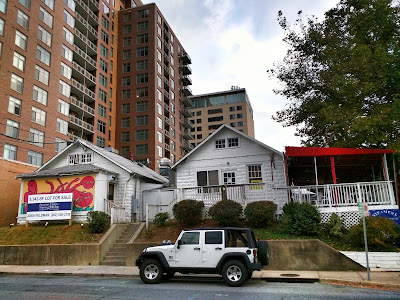Montgomery County planners proposing more residential and retail development in the Rock Spring area of Bethesda encountered strong resistance from residents concerned about overcrowded schools last night at Walter Johnson High School. With the area facing a potential addition of thousands of new residents, and residents cynical from past promises-not-kept by elected officials, parents said they wanted to hear detailed plans for increasing school capacity.
But planners had no such answers ready, leading to a virtually-unprecedented intervention by the chair of the County Planning Board in the meeting, and leaving one new resident wondering aloud if she had made a mistake in moving to Bethesda.
In the words of one resident, planners pushing for dense, urban redevelopment of suburban office parks in Rock Spring are doing something "the community is not inviting you to do." After delivering a not-entirely-accurate summary of the current real estate and economic development profile of Rock Spring - largely drawn from a
biased, taxpayer-funded study I discredited months ago - planning staff opened the floor to questions.
Residents summed up their top concern in 3 words: schools, schools and schools.
"We want space in our schools, and that's not a selfish thing - it's for our children," one said. Paula Bienenfeld, president of the Montgomery County Civic Federation, recalled Montgomery County Public Schools Director of Planning Bruce Crispell's conclusion that White Flint would need a new elementary school. But "the [County] Council kicked the can on that one, and that's why we're concerned" about Rock Spring, she said.
Planners promised MCPS will be part of the discussion, which will include a special meeting dedicated to the topic of schools. That meeting will be held September 17 at 7:00 PM at Walter Johnson HS. That didn't lessen concerns from residents who were convinced their feedback would again fall on deaf ears.
 |
Newsworthy - NBC4's
Jackie Bensen interviews
a resident at the
meeting |
"You're going to meet with the schools, but you don't have a school plan," one pointed out. "We don't have faith in our elected officials," another said, "because our experience is, it doesn't get done." "It's a little bit of a trust issue," said a third. "I have some doubt."
Planners struggled to respond, at one point arguing of schools in the Walter Johnson cluster that "some are not overcrowded." The crowd was incredulous at that assertion, with one person shouting, "Wrong!" emphatically.
A Stratton Woods resident questioned why the proposed Toll Brothers residential development at the nearby
WMAL transmitter site wasn't being considered in the study. There should be coordination between this plan and that potential major student generator, she argued, but "apparently there ain't none." "That's on the other side of Democracy Boulevard," a planner responded, evoking chortles of exasperation from the crowd. "Please," one resident said loudly in disbelief at the planner's reasoning.
Pointing to a list of planning staff assigned to the Rock Spring plan update, one attendee asked, "Who on that list is dedicated to ensuring there are schools?" "Everybody," a planner replied. "Everybody," the questioner repeated. "So you mean, 'nobody,'" she added. "What part of the problem is," she continued, "is to realize [this discussion] was the first mention of schools in this presentation. It just feels that it's separate and apart from the rest of the process," she concluded to vigorous applause.
One resident had heard enough. An NIH employee, she said, "I moved to this area to send my child to Ashburton [Elementary School]. I keep hearing about the new development being approved. I'm [now] regretting my decision to move here five years ago, and wondering if I should be moving out."
School overcrowding should be addressed before development is allowed, another resident said, but "It's not. It's just not." "We can't take responsibility for everything that's happened up to this point," a planner told the crowd - despite his department being in charge of every development plan passed in the county.
"There's a whole bunch of stuff in the tool box," a planner assured the crowd hopefully. Some attendees said they were still waiting to hear about these supposed tools from Councilmember Roger Berliner, who held a summit on infrastructure and development earlier this year. Berliner was not at last night's meeting.
Residents weren't buying the answers, such as they were, that were available last night. "We're not going to say we have the answers," one planner told the crowd. "We don't."
"Does anybody on the Planning Board actually have kids in the [school] system?" one resident shouted.
Planning Board Chair Casey Anderson rushed from the back of the room, and proceeded to hijack the meeting with an extended speech that was not on the official program for the evening. This was inappropriate for several reasons.
First, this is a meeting for planning staff to receive feedback from residents. It is not a Planning Board meeting. The Planning Board will receive a staff draft from planners in the future, and will have virtually unlimited time to opine and debate its merits at that juncture. Anderson's move was akin to a U.S. Senate debate being interrupted, and taken over, by the Chief Justice of the Supreme Court. Was the crowd getting the best of the back-and-forth with planners? Absolutely. Was Anderson annoyed by that outcome, as he and some others on the board were when the same thing happened during a meeting on the Westbard sector plan last year? Probably.
But a lot of people in the room, including myself, may have been annoyed about many statements made in the presentation - or even during Anderson's speech - we thought were false or misleading. We don't have the opportunity to grab the microphone, make an unlimited speech, and take on our detractors and rebut them point by point in this particular venue. Should Anderson have that luxury? Is this now going to happen at every sector plan meeting in the future?
Furthermore, Anderson appears to already be endorsing the broad concept of redeveloping Rock Spring as a mixed-use town center that was hinted at by planners last night. This is not the first time Anderson has been in a public role of pressing for new development. He has already publicly described a new urban future for squarely-suburban Aspen Hill, nowhere near Metro, for example. That is not a role planning commissioners are supposed to take. In fact, they're not supposed to make public statements of their opinions on a particular plan or project at all at the stage Rock Spring was in last night.
A O'Fallon, Illinois planning official, Ted Shekell, explains this quite well on the
PlannersWeb website:
"One of the most important roles of the planning commissioner is to be an objective, fair-minded representative of the community. As those in the arena of city planning know all too well, land use issues frequently bring out passionate opinions from all sides, with the voice of reason and balance often coming from the planning commission.
Having said that, if commissioners become partisan or politically motivated in their decision-making, or if the appearance of fairness and open-mindedness is breached, then the confidence the public has in the commission’s decision-making process will deteriorate rapidly. So, it is of the utmost importance to resist the temptation to “make up” one’s mind before hearing all the facts -- for the sake of the individuals with a stake in the issue, and ultimately, for the integrity of the democratic process itself."
With that in mind, it is not appropriate for Anderson to argue that residential growth in Rock Spring "will improve our ability to attract [office] tenants." The debate on that hasn't even fully started yet.
In fact, Rock Spring's suburban office park character has virtually nothing to do with why it has a particular vacancy rate. 4500 East-West Highway is virtually vacant, two blocks from Metro in downtown Bethesda. 7550 Wisconsin Avenue had to discard its grander plans for large corporate tenants, and chop up its floors into smaller units, to attract any tenants at all - and it is even closer to Metro, and walking distance to all of the wonderful restaurants people are telling us are necessary to attract millennials. So where are the companies and the millennials at those Class A office buildings?
The main reason for vacancies at Rock Spring and other office parks is that Montgomery County's business climate is hostile, and the county enjoys the worst-ranked traffic congestion in America - capped off by a lack of direct access to Dulles International Airport, the stated choice of international firms. If we ignore those factors, and destroy office space in favor of residential, we won't "improve our ability to attract office tenants" at all. There also seemed to be a misperception that planners are going to add office space to Rock Spring. Nothing of the sort is going to happen; in fact, existing office space will be demolished. No one would clarify that to attendees, perhaps hoping that the idea was bolstering the case to destroy office space. A number of speakers were already convinced that office space has "failed" at Rock Spring, even though they oppose the redevelopment with urban residential.
Anderson also boasted that he and the board have never failed to deliver a needed school, despite numerous people referring to the never-delivered elementary school in White Flint throughout the evening. And then there's Wood Acres ES in Bethesda, where that "never fail" record required 6 portables within a few years of the new school being built. That overcrowding is only being addressed years later with an addition.
Finally, Anderson claimed that Rock Spring office workers are "trapped in the middle of the day with nowhere to go" for lunch. At least one other official made the same claim last night. That left me wondering if any of them have actually been to the office parks in Rock Spring. There are convenience stores and at least two cafes at the Vornado/Suburban Hospital buildings on Rockledge. Stop by for lunch, and you'll see a constant parade of workers carrying takeout containers back to their offices. I've even dined at one myself.
And those offices are - believe it or not - walking distance to the nearly-endless food offerings at Westfield Montgomery Mall, Georgetown Square, Westlake, and Wildwood Shopping Center. Hopefully, planners will add those stops to the bike tour of Rock Spring.
Residents already know about those many restaurants, citing them and their shopping centers among the strong points of the Rock Spring location. During breakout sessions, residents asked planners to "preserve the suburban, bucolic character of the area." Among things they would like to see in the plan are a trail to Cabin John Park, safer ways to cross Democracy Boulevard and Old Georgetown Road, and keeping new development to a scale comparable to existing shopping centers or parts of the Kentlands, rather than urban heights and density.
There's no doubt Rock Spring could be improved in any number of ways. But if we put our heads in the sand over the real drags on economic development and the county's moribund economy (we haven't attracted a single large corporation in over a decade), we'll never become more attractive as a destination for the corporate headquarters, laboratories and research facilities that demand the larger, secure campuses Rock Spring excels at providing.
Millennials don't drive cars? They don't dine inside their corporate headquarters? They only work in dense urban cities by transit stations?
Man, do I have a couple of businesses for you to visit: Facebook and Google. Their campus headquarters are, yep, just like Rock Spring. Millennials care about high-wage jobs, and they'll go anywhere they are being produced in abundance.
One resident may have summed up what the goal of the plan should be best:
To create a model development "that those companies want to come for, but we want to stay for."


























































